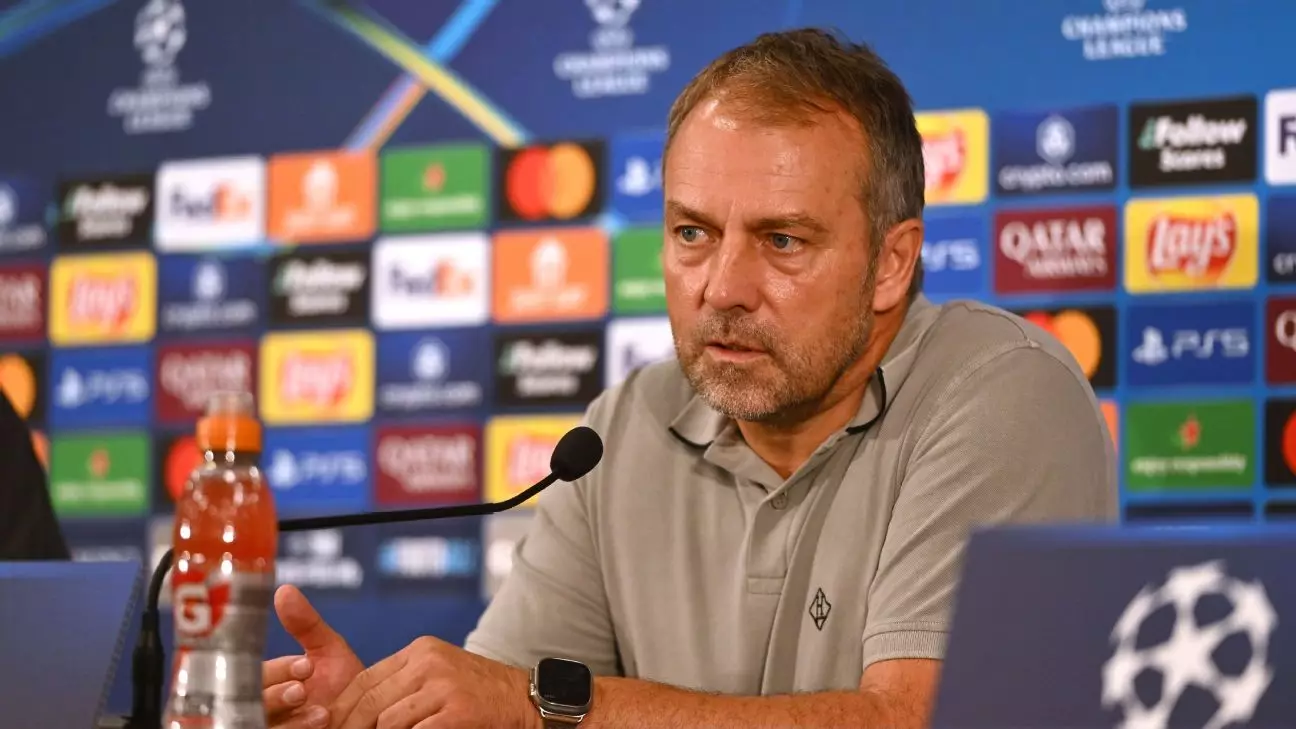In the high-octane world of professional football, the demands placed on players are magnified at the start of a new season. FC Barcelona’s head coach, Hansi Flick, is acutely aware of this reality as his team embarks on what promises to be a grueling season marked by an intense schedule. The weight of expectation and the pressures of competing at both domestic and European levels have made managing player fitness and performance a paramount concern.
In the wake of a promising start in LaLiga, where Barcelona racked up five consecutive victories, the team’s recent performance in the Champions League resulted in an unexpected defeat to Monaco. This setback serves as a crucial reminder of how quickly the tide can turn in football. Flick’s response to these dual challenges—injuries and a packed fixture list—will be pivotal for Barcelona’s campaign moving forward.
The injury crisis at Barcelona is now a pressing concern, with significant players such as Ronald Araújo, Andreas Christensen, and Frenkie de Jong sidelined. Flick’s strategy must be adaptable; bench strength will be crucial as the team faces a relentless schedule. Despite these setbacks, the coach remains steadfast, asserting that he will not use injuries as an excuse. Instead, his focus is on optimally utilizing the remaining squad depth while maintaining performance levels.
Flick’s philosophy is straightforward: prioritize resilience and adaptability. His declaration of “no excuses” encapsulates a winning mentality intended to galvanize his players. In Wednesday’s press conference, he revealed, “Every third or fourth day we have matches, but I think we are able to manage it.” This not only reflects an understanding of the situation but also a challenge posed to his players to rise above it.
As key figures within the football community amplify the discourse about the players’ welfare, Flick has joined the chorus calling for UEFA and FIFA to reconsider the current match schedule. His concerns echo a larger conversation about player fatigue and the long-term sustainability of such an intense calendar. The ongoing debate reached a boiling point when Manchester City’s Rodri suggested the possibility of a players’ strike due to match overload—a notion that starkly illustrates the gravity of the situation.
For Flick, and many coaches grappling with similar predicaments, the integration of a fatigue management strategy becomes essential. He highlights the importance of ensuring the physical well-being of players, stating, “If you want the quality on the highest level, I think we have to reduce it.” This urgent call for reform in the scheduling of matches could be the necessary first step toward prioritizing player health amidst the sport’s commercial pressures.
With an important clash against an unbeaten Villarreal on the horizon, Barcelona must harness whatever tactical edge they can. Despite injury woes and player absences, Flick expresses optimism about his team’s readiness. “I know we lost against Monaco, but I’m pleased with how we defended with nine players in the previous match,” he noted, emphasizing tactical discipline as a cornerstone for overcoming challenges in the upcoming fixtures.
Moreover, Barcelona’s players must rally and focus on tactics to create space and control possession—a hallmark of Spanish football. Flick’s belief in the collective ability of his players to perform under pressure is evident as he encourages them to approach their league encounters with confidence and self-assurance.
The discourse surrounding critical performances naturally extends to individual players, notably goalkeeper Marc-André ter Stegen, who faced scrutiny after the loss to Monaco. Flick defended Ter Stegen’s abilities, describing his skill set as foundational to the team’s strategy. “This is one of his strengths—playing out from the back,” he pointed out, asserting that while mistakes can occur, resilience must take precedence.
In moments of heightened pressure, strong leadership from a coach like Flick becomes essential. By instilling confidence in his players, he fosters a culture of accountability and resilience that will be crucial for navigating this challenging period for the club. As Barcelona aims to bounce back and sustain their competitive edge, the coming weeks will reveal how well they can manage adversity while pursuing both domestic and European ambitions.
Barcelona stands at a crossroads where resilience and adaptability will define their trajectory for the season. With Flick at the helm and the spirit of determination coursing through the team, fans can only hope that their club will rise to meet the challenges ahead.

Leave a Reply